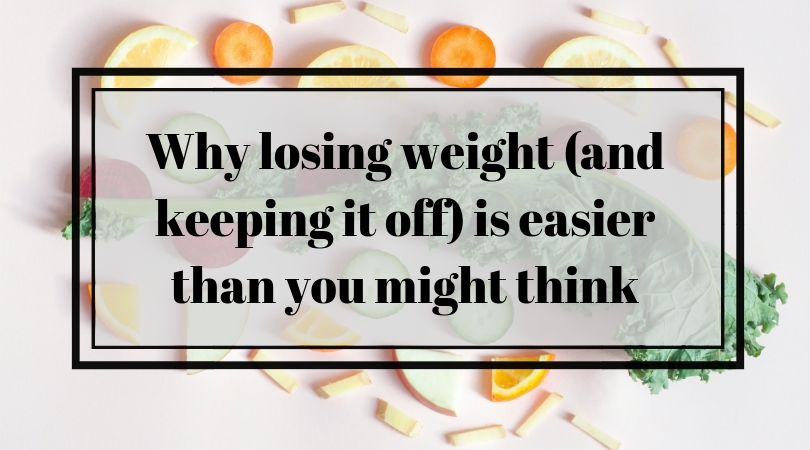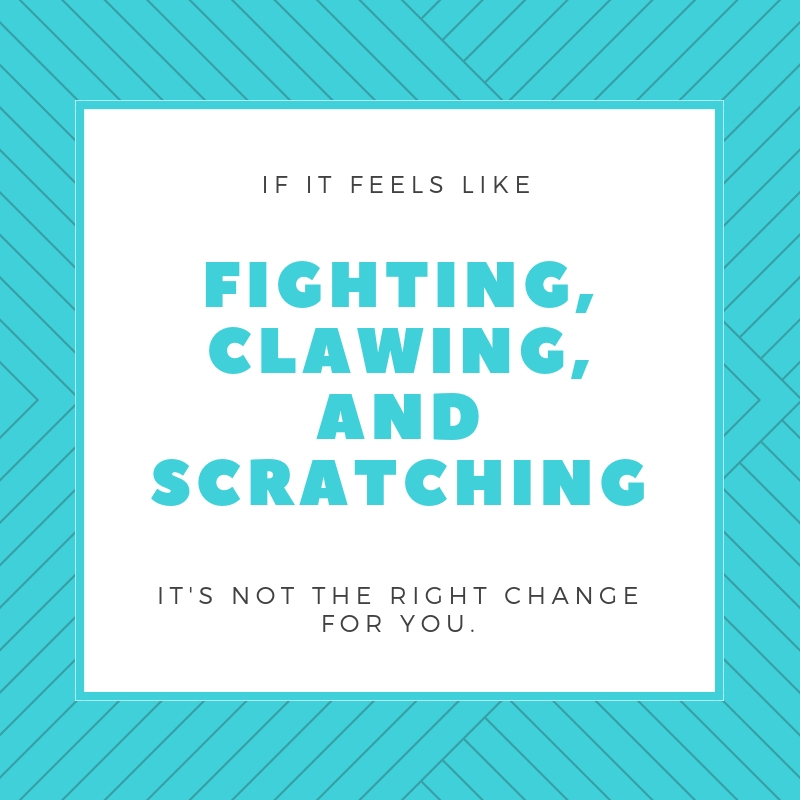Regardless of your body’s size, maintaining positive habits makes a significant difference in your overall health. Sometimes, though, your health goal itself may include losing some extra fat that is causing you discomfort or health problems. Weight loss is a commonly sought after and frequently frustrating goal – mostly because there is so much confusion about how to effectively go about it! After working as a dietitian for 6 years, I’ve compiled a list of my top 15 weight loss tips to help you meet your goals. Enjoy!
1. Ease into it
I know this might be a weird thing to hear from a dietitian, but don’t come out of the gate doing every healthy thing you can think of. Plan a couple of healthy changes, add them into your life, get used to them for a few weeks, then add in a couple more.
There are a couple of reasons I recommend this – first of all, it’s much more likely that you’ll be able to stick with your new habits if you have a little time to get used to them and work out the kinks. Second, nearly everyone will run into a plateau at some point on their journey. For plateaus lasting more than 2-3 weeks, it’s nice to have a couple of healthy changes in mind to get things moving again. If you start out by maxing out your exercise and strictly limiting your food intakes, you don’t have anywhere to go when things inevitably get stuck.
2. Be part of your own plan
As tempting as it is – trust me, I know – avoid going for pre-made meal or diet plans. These plans are convenient and seem simple, but they were not made to match your lifestyle. They may get you moving along for a week or two (or even a month or two), without teaching you to make your lifestyle more healthful. Often, they contain foods you don’t care for and leave out some of your favorites – that’s no way to live! This is one reason I don’t make meal plans for my clients. Participating in the creation of your own healthy plan will help you practice making a healthy lifestyle that you actually enjoy and can follow long term. If you’re lost on how to do this, find a Registered Dietitian to help you!
3. Don’t expect (or aspire to) perfection
Do not expect to never eat your favorite foods. Do not aspire to never eat your favorite foods. It makes me sad just to think of it! You can and should include all kinds of foods that you enjoy while meeting your health goals. Do it intentionally and without guilt. Including favorite foods will help your plan be sustainable and enjoyable, and prevent out-of-control bingeing.
4. Consider your personality
A sustainable healthy lifestyle is about so much more than calorie calculations and exercise. Consider aspects of your personality that you may never have thought of in relation to nutrition and fitness before. Are you detail-oriented? Tech savvy? Flexible? Need structure? Tend to obsess? All of those things should play into your choices about which paths to take. If you’re not sure how to do that, check out this handy graphic to guide you.
5. “Begin as you mean to go on”
Originally said by Charles Spurgeon, the sentiment of the quote is to only begin a life change that you expect to be able to continue long-term. Do not begin any nutrition plan that you only intend to follow temporarily. Your plan should be sustainable. Now, sometimes, life will happen and you’ll have to change up your plan accordingly, or you’ll change it up to match your workouts, for example. The point is that you shouldn’t embark on a plan that you know beforehand will be too hard to stick with after a few months.
6. Embrace the trial and error
Approach your healthy plan as a series of trials and errors, designed to find the healthy plan that perfectly fits your life. If you try something that doesn’t work, it’s not failure, it’s information. That wasn’t the right approach for you. Try another! Keep going, and you’ll have ironed all of the wrinkles out of your plan and it will fit your lifestyle like a glove.
7. Make sure you’re eating enough
There is so much bad info out there. Weight loss is so much more than eating less and moving more. In fact, about half of the clients I see who are trying to lose weight are undereating, not overeating. Their undereating is what keeps them from being able to lose weight! Without going into the nitty-gritty hormonal details, chronic over-restriction leads your metabolism to slow down and puts your body in fat-saving/fat-storage mode. Strict calorie restrictive diets actually teach your body to store fat. The next time someone says that you should be eating 1200 calories per day to lose weight, just let that comment roll off your back. The goal is to eat exactly what your body needs, minus just a tad. Then your body won’t mind filling in the gaps with extra fat.
8. Don’t fear the carbohydrate!
While we’re on the subject of slowed metabolism, let me address one of the most common weight loss mistakes I see – undereating carbohydrates! Poor carbohydrates, they get such a bad rap as being one of the leading causes of weight gain. Not true! Carbs are the primary fuel our bodies use. When our bodies don’t get enough carbs for a while, they slow our metabolisms down to “survive the winter.”
This is why nearly every low-carb diet works spectacularly for a while, then weight tends to plateau. Typically as soon as you start adding carbohydrates back in (no matter how gradually), most of the lost weight comes back. This is because your body believes it is now summer again – time to start stocking up fat for the next period of starvation!
This is not to say that a mild decrease in carbohydrates can’t help speed weight loss, but drastic reductions are not the answer for sustainable weight loss. Lose the weight in a way that includes carbohydrates, proteins, and fats, but choose well in each category. Go for complex and nutrient-dense carbohydrates like whole fruits, nuts, seeds, whole grains, and low-fat dairy or dairy alternatives. Choose lean proteins like skinless poultry, lean beef or pork, fish, eggs, and nuts. Aim for liquid, plant-based fats like avocado oil and olive oil. Add plenty of antioxidant-laden veggies. 🙂
9. Hold steady (and expect plateaus)
Plateaus happen for all but the very lucky in weight-loss journeys. Sometimes they happen for a discernable reason, sometimes your body just isn’t feeling like losing weight that week. Don’t stress, and continue doing what you are doing. If your weight sticks for more than 2-3 weeks, only then is it time to consider tweaking your plan. Try adding a little time or intensity to your workouts, or add in some cross-training.
10. Build in non-scale victories
Keep goals besides weight-loss goals, because sometimes the scale just doesn’t want to reflect the hard work you’re putting in. It happens. To everyone.
My faves are achievement goals. They are the most fun! Explore new territory – maybe something you’ve always dreamed of doing but never believed you could do. Want to learn to box? Hike part (or all!) of the Pacific Crest Trail? Ride a horse? Become a personal trainer? Play tag with your grandkids? Skydive?
Pick one that fires you up. Consider your workouts training for that dream. Be consistent. Achieve it. Pick a new goal. Rinse and repeat.
11. Embrace health improvements, not just pounds lost
Along those lines, make changes for their benefit to your health, disease prevention, or an increase in energy. Believe in the good you are doing for your body by moving it more, eating more vegetables, or drinking more water. Read handouts or books about it if you need to! Sometimes it seems the only reason someone is willing to do anything healthy is to watch the number on the scale go down. While that can be a satisfying and healthy goal, the scale does not always cooperate (as mentioned above). If you’re putting all your eggs in that basket, you’re setting yourself up for frustration. Instead, notice the way your body feels – your energy levels, your digestion, your skin, the way your clothes fit. All of those are signs that you’re headed in the right direction, and none of them require weight loss.
12. Ditch an “all-or-nothing” mindset
Some people are inclined to have an “all-or-nothing” mindset, particularly about nutrition or fitness. Either they’re doing all the things – eating “clean,” working out out 5 times a week, drinking enough water, and taking their vitamins – or they’ve given up on being healthy. One day of a missed workout or a serving of french fries leads them to throw in the towel on all of their healthy habits. Health does not work this way, and neither should you think this way about your health. Every step is a step in a healthier direction. Don’t let one “imperfect” moment tell you how everything has to be. Just pick it back up and move on.
13. Steer clear of “diet lingo”
While we’re at it, avoid phrases like “eat clean,” “cheat days,” “cutting carbs” and “guilty pleasure.”
There’s nothing dirty about dessert, eating cheese is not cheating, carbs don’t need cutting (except with a bread knife), and no tasty food should make you feel guilty.
Using these phrases reinforces the mindset behind them, and that is not a helpful mindset. All food can fit in a balanced weight-loss lifestyle.
14. Rewrite your cassette tapes
This is an idea one of my clients had and I loved it. She said she had all of these old self-deprecating diet “cassette tapes” playing in her head, telling her she was too fat, shaming her for what she would choose to eat, or telling her that fruit was bad because it was too high in sugar. As she was working with me, she learned that the voices on these tapes were misinformed or just plain wrong. She had to make a conscious effort to “record over” the unhelpful voices with something she knew to be true. She actively thought about how nutritious fruit is and how the fiber helps her digestion, or how she is making many efforts to improve her health and she should not be ashamed for the choice she is making now. Rewriting her tapes enabled her to take charge from all of those old, useless philosophies that had held her back for years.
15. Believe in yourself – no matter how long it takes, you can do it.
If you follow the other tips, losing weight and making healthy changes shouldn’t be excruciating. If it is, it’s time to change your plan! I certainly won’t say it will be a walk in the park (though it may involve some of those!), but it’s doable. It takes consistency, patience, and dedication to the process over anything else. Slow and steady, and if you need some help, go and get it. There’s no shame in that. You can lose weight. You can improve your health. Believe it.






